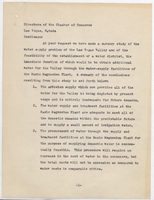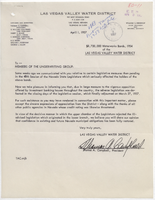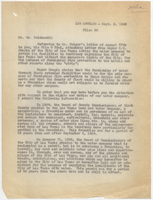Search the Special Collections and Archives Portal
Search Results

Jill Roberts oral history interview: transcript
Date
Archival Collection
Description
Oral history interview with Jill Roberts conducted by Barbara Tabach and Claytee D. White on March 20, 2018 for the Remembering 1 October Oral History Project. In this interview, Jill Roberts discusses her position as the CEO of the Trauma Intervention Program (TIP) of Southern Nevada. She also delves into her part-time work at the coroner's office as a death investigator and discusses her personal background in Las Vegas, Nevada after she moved to the city in 1977. She describes the role TIP had during the aftermath of the October 1, 2017 mass shooting, where well-trained volunteers were dispatched to hotels, hospitals, and anywhere else the survivors reached in order to provide emotional and practical support. Throughout the interview, Roberts emphasizes that the assistance provided to those in a traumatic event depends on each individual's needs. She shares a few examples of what the TIP volunteers had helped with after the shooting, including listening to the survivors' stories as well as providing information on the situation, helping separated loved ones find each other, arranging travel for some survivors to go back to their homes, and procuring clothes and shoes for those who needed them. Roberts also discusses the gratitude TIP had received after the shooting, including the thank you cards sent by Sandy Hook High School.
Text
Bethany Khan, Ken Liu, and Zachary Poppel (Culinary Union) oral history interview conducted by Elia Del Carmen Solano-Patricio: transcript
Date
Archival Collection
Description
From the Lincy Institute "Perspectives from the COVID-19 Pandemic" Oral History Project (MS-01178) -- Business interviews file.
Text

Anita Tijerina Revilla oral history interview: transcript
Date
Archival Collection
Description
Oral history interview with Anita Tijerina Revilla conducted by Marcela Rodriguez-Campo on October 09, 2018 for the Latinx Voices of Southern Nevada Oral History Project. In this interview, Revilla discusses her early life in San Antonio, Texas. She talks about her decision to make education a priority, figuring out the college application process on her own, and her initial interest in social justice. Revilla talks about how her critical consciousness was developed, and her pedagogical approach to teaching. Revilla describes her role in the 2006 May Day march, advocating advocating for the queer community, and disrupting oppressive systems to increase educational access for students. Lastly, Revilla discusses ethnic studies and the history of inequality in the United States.
Text

Alex de Castroverde oral history interview: transcript
Date
Archival Collection
Description
Oral history interview with Alex de Castroverde conducted by Monserrath Hernandez on April 17, 2019 for the Latinx Voices of Southern Nevada Oral History Project. In this interview, De Castroverde discusses his family's background and his parent's emigration story from Cuba to the United States. He talks about growing up in Reno, Nevada, his father becoming a lawyer, and attending the University of Nevada, Reno. De Castroverde remembers the establishment of De Castroverde Law Group, the significance his father had on the Hispanic community in Las Vegas, Nevada, and taking over operations of the law firm with his brother. Lastly, De Castroverde talks about his involvement with Cristo Rey St. Viator College Preparatory High School, the Guinn Center, and the Las Vegas Business Academy.
Text
Laura Perkins (University of Nevada Regent) oral history interview conducted by Kelliann Beavers: transcript
Date
Archival Collection
Description
From the Lincy Institute "Perspectives from the COVID-19 Pandemic" Oral History Project (MS-01178) -- Elected official interviews file.
Text

Letter from Alfred J. Ryan to the Directors of the Las Vegas Chamber of Commerce, circa 1950
Date
Archival Collection
Description
Discussion of the feasibility of bringing water from Lake Mead to Las Vegas. Pittman is an older name for the city of Henderson. Whitney is an older name for East Las Vegas.
Text

Report, Flood control and soil conservation in southern Nevada
Date
Archival Collection
Description
Brief history of flooding along the Virgin River and a list of work undertaken to prevent or diminish future flooding.
Text

Letter from Thomas A. Campbell (Las Vegas) to members of underwriting group for bonds, including supporting documents, 1957
Date
Archival Collection
Description
Letter from the Las Vegas Valley Water District's president informing the District's bond underwriters that pending legislation had been defeated. The measures would have affected holders of the $8,700,000 waterworks bonds. Supporting documents from the District include a report dated March 30, 1957, which summarized the six pieces of legislation and a press release dated April 1, 1957, outlining the 48th session of the State Legislature's decisions on the legislation.
Text

Letter from E. E. Bennett (Los Angeles) to William Reinhardt, September 3, 1948
Date
Archival Collection
Description
Las Vegas Mayor E. W. Cragin asked that the Las Vegas Land and Water Company extend pipelines for fire protection down the Strip. Bennett had the opinion that the company could not be legally compelled to do it, and the newly formed water district was a more logical source of water.
Text

Transcript of interview with Velma Haselton by Catherine Bellver, September 13, 2001
Date
Archival Collection
Description
Interviewed by Catherine Bellver. Velma Haselton was born in St. Louis, Missouri, in 1914. She worked as an assistant bookkeeper for Hart, Schaffner and Marx and rose to Assistant Credit Manager. Velma worked at various jobs after she married for the second time and her son was born. She also represented the San Francisco CPA firm Lybrand, Ross Brothers and Montgomery (now Coopers Lybrand) in various capacities, both in California and St. Louis, eventually attaining the position of controller. Velma moved to Las Vegas for the first time in the 1950s, where she and her husband Don ran a coffee shop at the Park Lane Motel on South Fifth Street. Family requirements necessitated a move back to California. In 1971, Velma and her third husband, Charles Haselton, "retired" to Las Vegas. Velma immediately went to work as a cost accountant for United Pipeline, and later as an accountant for Kafoury Armstrong, a CPA firm. She eventually ran her own accounting business. Velma also held memberships and offices in various women's service groups.
Text
